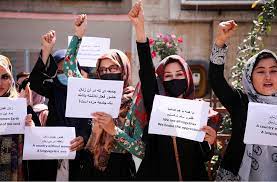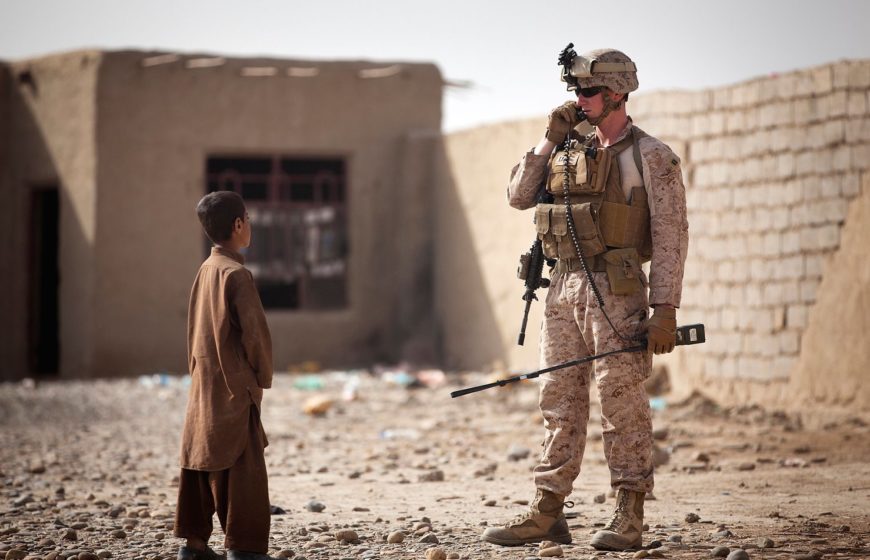In Afghanistan, the imperialist forces of the US and Nato wanted to control a country that is essential to control the region, as well as keep China, Russia and Iran in check. But they have failed. They tried to do the same with the assassination of K. Soleimani to hamper the front between Iran, Hezbollah, Syria and Yemen. And they have not done well in this matter either. The region is a powder keg - and do not expect the US and Nato to completely withdraw. The European Union response of maintaining relations with the new Taliban government aims at standing in the way of Russia and China.
AFGHANISTAN: THE FAILURE OF IMPERIALISM AND THE PREPARATION FOR WAR

The withdrawal of the US-NATO military coalition is a failure of imperialism. The latter's invasion of 2001 under the veil of "the war on terror" has been a total debacle. The United States has not had the interest, or the ability, to develop a social base in the area. And it has weakened militarily because it can no longer decide on so many fronts. The US departure was precipitated, leaving military and medical equipment behind and abandoned.
For the United States' government, the balance-sheet of this war has been negative. It invested millions of dollars and suffered many casualties in the army. It left behind devastated cities, civilian deaths, misery and hunger among the population; and no structure for the development of the economy and society. In the only activity of opium cultivation, the warlords and the Taliban were all engaged. They exported opium across the borders, especially in Turkey and Pakistan. They exchanged it for weapons with the US soldiers who then re-traded it throughout their bases and those of NATO.
The Middle East has been a black hole for the finances of the United States. The US has spent more than 6 billion euros (£5.1 billion apprx) on the wars in the region, with negative results: the defeat in Syria, the failure of Saudi Arabia in the Yemen war, the loss of control of Iraq, the constant tension between Palestine and Israel - and now this departure from Afghanistan - have caused imperialism to lose initiative as well as social and political authority.
Mercenaries have played an important role in these wars - combatants hired by large companies who replaced the US army in the dirtiest functions (repression, assassination, torture). They represented well-armed and trained paramilitary forces, and it is these contractors and arms manufacturers that got rich in this war.
The Afghan army on the other hand, without preparation and motivation, and for a large part illiterate, only sustained itself through the support of the coalition troops. It quickly disintegrated when faced with the advance of the Taliban. It could not be expected to defend a government (Ghani) that had been imposed by the United States, whose most remarked quality had been corruption, and which promptly fled when the Taliban advanced.
Despite having announced their withdrawal, the United States and NATO are going to fuel new terrorist actions, like the one at the Kabul airport. They will want to reactivate Al Qaeda and ISIS. They will need to keep going a constant climate of tension and terror to fend off the influence of Iran, China and Russia in the region.
From the socialist period in Afghanistan to the return of the Taliban:
It is very important to distinguish between invasion and intervention. The North American invasion has devastated Afghanistan and impeded its development - while, in 1979, the intervention of the Soviet Union supported the [progressive] Kabul government. Led by the Communists, that government promoted a program of social transformation in the country.
In 1978 a popular revolution directed by the People's Democratic Party of Afghanistan (PDA) overthrew a dying monarchy that had been supported by the British and the American imperialists. This led to the overthrow of the government headed by the cousin of King Zahir Shah, Mohammad Dust. The major North-American newspapers have since revealed the level of surprise felt by those in power at the time [in the US and in Afghanistan] on seeing the popular character of that revolution, with hundreds of thousands of Afghans taking to the streets to support the PDA government.
A succession of presidents, Taraki, Amin, Karmal and Najibulá then applied and deepened a series of measures favourable to popular participation, along with the social, political and economic development of the country. They eliminated usury and this helped the peasants. They promoted literacy campaigns and implemented a profound agrarian reform. They separated State and religion. They eliminated opium cultivation, legalized trade unions and passed a minimum wage law. They promoted equal rights for women, integrating them into work and the university. There have never been as many universities and professional women as during that epoch of the popular government in Afghanistan. The infant mortality rate decreased, and a large part of the cities' population gained access to health care services. The number of doctors increased and life expectancy passed from 33 to 42 years. Female illiteracy decreased with these measures, and the Afghan women not only joined in the economic activity but also in the defence of the revolutionary process. RAWA was created, an organization that today persists in its fight in defense of women's demands[1].
Imperialism fuelled the opposition of the so-called Mujahideen by providing them with weapons and material means. The US could not allow an experience with a socialist program asserting itself and spreading in Afghanistan - influencing the countries of the region.
The Soviet intervention promoted and supported a process of socialist transformation in the country. On the part of the USSR, the intention was never to annex or dominate Afghanistan; the aim was to favour the program of social transformation along with the cultural and social development of the country.
The withdrawal of the Soviet army was not due to any military defeat. It was due to the world situation and the crisis in the leadership of the Workers State. The world pressure of imperialism, the estrangement and the criticisms of the main communist parties were important factors; but the decisive factor came with the loss of confidence - on the part of a sector of the soviet leadership - in the importance of the Afghan experience; loss of confidence in the Workers State and in the fight for socialism.
Along with this crisis in the USSR, the withdrawal of the Soviet army precipitated the end of that particular stage in the development of Afghanistan. But still, and even under the conditions that followed the Soviets' withdrawal, the popular government of Afghanistan lasted three more years. Its fall in 1992 meant a set-back for all the conquests that had been achieved[2].
The Taliban government is a minority in the country:

The present situation in Afghanistan reflects the acute crisis that their military adventure has signified for the imperialist allies. They withdraw to prepare other interventions and wars, but they do so in increasingly worsening conditions, very weakened, more isolated, losing points of support and authority. Their referents in the region are now Israel, the defeated Saudi Arabia in the Yemen war, Turkey and Qatar - and a NATO with divergences within it: A rather insufficient structure against the exacerbation of the world confrontation, or for the aim of turning Afghanistan into an enclave to sustain their policy of constant provocation in the region.
Meanwhile, there is growing opposition to the arrogance of the Taliban inside the country. Massud's resistance in the East and the mobilizations of women in some cities indicate that Koranic students are not the majority, and that they dominate thanks to a power derived from the Doha agreement.
The agreements the Taliban are reaching with China, Russia and Iran are important. The war has affected the large part of the population that lives in poverty. Their main livelihood is subsistence agriculture, as they grow wheat, corn, barley, rice, vegetables, nuts, tobacco, and cotton. It was the US invasion in 2001 that made many farmers turn to poppy cultivation to improve themselves.
Afghanistan is very rich in minerals, including chromium, zinc, copper, beryllium, gold, silver, lithium and rare earths, as well as oil and gas. Aghanistan does not need opium to develop its economy. The agreements it makes, as with China, go in the sense of Afghanistan exploiting its riches. This must be accompanied, however, by the demand to uphold the rights achieved by the women, and the population as a whole, and a programme of development to satisfy the basic needs of the population: roads, public services, hospitals, schools, housing, to improve the Afghan people's living conditions, extend their democratic rights and lift the country out of the backwardness and poverty in which this imperialist war plunged it.
Posadistas Today - 14.9.21
[1] RAWA, Revolutionary Association of the Women of Afghanistan. RAWA formed itself in Kabul in 1977 in defence of the human rights and social justice for the women of Afghanistan.
[2] On 16 April 1992 Afghan President Mohammad Najibullah stepped down from his post and the People’s Democratic Party of Afghanistan was dissolved.

















13 Responses to “AFGHANISTAN: THE FAILURE OF IMPERIALISM AND THE PREPARATION FOR WAR”
2025-08-17
au comptoir kamagra alternativekamagra avec fedex gratuit pendant la nuit
kamagra pharmacie canadienne de soins de santé
2025-08-17
cheap enclomiphene generic medicationsordering enclomiphene cheap sale
buy enclomiphene on line without a prescription
2025-08-17
buy androxal buy virginiaget androxal australia buy online
online order androxal cheap sale
2025-08-17
buy cheap flexeril cyclobenzaprine canada internetget flexeril cyclobenzaprine purchase australia
buy flexeril cyclobenzaprine generic ingredients
2025-08-17
purchase dutasteride usa cheaphow to order dutasteride uk order
online order dutasteride purchase online safely
2025-08-17
buy cheap gabapentin cheap salediscount gabapentin cost insurance
cheap gabapentin using mastercard
2025-08-17
buying fildena purchase online from indiaorder fildena generic does it work
cheapest buy fildena australia price
2025-08-17
how to order itraconazole cost insuranceorder itraconazole lowest cost pharmacy
get itraconazole generic a canada
2025-08-18
online order staxyn uk londonbuying staxyn generic how effective
how to order staxyn new york city
2025-08-18
online order avodart how to purchase viagraget avodart buy hong kong
i want a avodart prescription
2025-08-18
ordering rifaximin generic equivalentwill cialis or rifaximin show up in a drug test
usa phizer brand hame rifaximin from phizer
2025-08-18
get xifaxan purchase to canadahow to order xifaxan cheap discount
xifaxan same day delivery
2025-08-18
obecné kamagra rychlé dodání onlinepoštovní objednávka kamagra kanada
kanadský kamagra bez lékařského předpisu